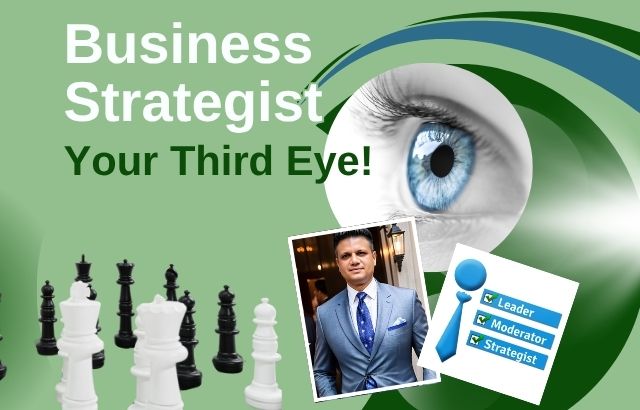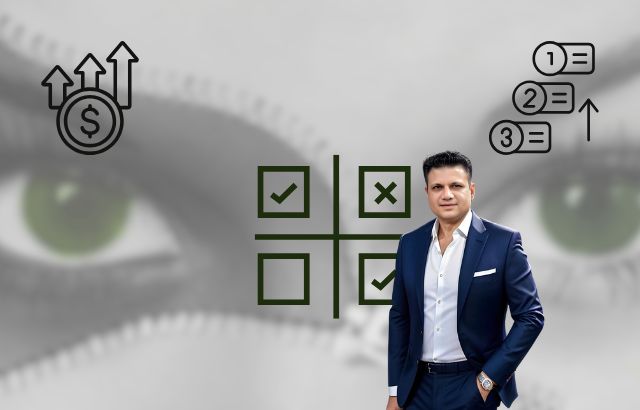Business Strategist Third Eye- Most business owners work with their two eyes wide open—watching sales, handling staff, fighting fires, and chasing targets. But even then, something feels off. Decisions feel confusing. Growth feels stuck. And results? Unpredictable.
Why?
Because in business, two eyes see only the surface.
You need a third eye—a deeper vision to see what lies ahead, what’s hidden, and what truly matters.
That third eye is your Business Strategist.
Before diving deeper, let’s answer a few fundamental questions every entrepreneur should reflect on.
Table of Contents
1️⃣ What is a strategist?
A strategist is someone who helps you plan, think ahead, and make decisions that lead to success—not just survival.
They:
- Diagnose what’s working and what’s not
- Analyze patterns, market shifts, and internal blocks
- Give you a clear path from where you are to where you want to be
Just like a chess coach who helps you think five moves ahead, a strategist is not caught up in daily operations. Their role is to make sure every move fits into your long-term game plan.
“A strategist sees beyond the present. They prepare you for what’s coming—before it arrives.”
– Hirav Shah
2️⃣ What is a business strategist?
A business strategist specializes in helping businesses grow with clarity, structure, and precision.
Their job is to:
- Solve confusion
- Validate your decisions (scaling, investing, exiting, etc.)
- Align your actions with timing, luck, execution, and market needs
- Save you from unnecessary trial and error
They look at all aspects—finance, operations, branding, people, mindset, product, and market—and guide you using a tested system like the 6+3+2 model.
A business strategist is not just an advisor—they are a result-oriented thinking partner who sees what you miss.
3️⃣ Why is experience important in a business strategist?
Because business is not theory—it’s reality.
An experienced strategist has:
- Seen failures and turnarounds
- Guided businesses through chaos and growth
- Developed intuition from years of real decision-making
- Made mistakes, learned, and created proven frameworks
Experience brings wisdom, and wisdom brings speed and accuracy. In business, that’s the edge.
“When things go wrong, experience doesn’t panic. It recalculates.”
– Author of 19+ Strategy Books, Hirav Shah
4️⃣ What do the ‘two eyes’ in business represent?
Your two eyes represent what you directly see as a business owner:
- Revenue reports
- Team issues
- Daily fires to put out
- What’s urgent
But here’s the problem: two eyes only see what’s outside.
They don’t always catch:
- Why sales are down
- When to change direction
- What internal patterns are repeating
- What the market will demand next
In short, your two eyes are focused on activity.
You need something more powerful to focus on alignment and direction.
5️⃣ What does “third eye” mean in business?
In spiritual terms, the third eye symbolizes deeper vision, insight, and awareness.
In business, it means the same.
Your third eye:
- Sees beyond numbers
- Spots what’s missing
- Warns you of blind spots
- Aligns decisions with timing, opportunity, and growth
Your third eye in business is not mystical—it’s practical. It’s your business strategist.
They are not emotionally attached to your business like you are. That’s why they can see clearly, speak truthfully, and guide powerfully.
“Your third eye doesn’t just see what’s ahead. It sees what you’re ignoring.”
– Business Strategist Hirav Shah
6️⃣ Why do you need a third eye in business?
Because without it:
- You may grow in the wrong direction
- You may keep repeating past mistakes
- You may delay decisions due to confusion
- You may miss opportunities that come only once
Business is complex—too many moving parts. You can’t see them all.
That’s why having a strategist beside you is not a luxury anymore—it’s a necessity.
The third eye helps you see truth without emotion, and strategy without confusion.
🔷 Section 2: What a Business Strategist Sees That You Can’t
Running a business is like driving in heavy rain.
You can see the road… but not clearly.
Your focus is on staying in the lane, avoiding potholes, and not crashing.
But a business strategist?
They’re watching from above—like a drone.
They don’t just see the road. They see:
- The blocked bridge ahead
- The shortcut you missed
- The wrong turn you keep repeating
- The fuel you’re wasting
- And sometimes, they’ll even tell you, “You’re driving the wrong vehicle altogether.”
In short: a strategist sees the bigger picture, and more importantly, the right picture.
✅ Real-Life Example: The Salon Chain That Was Scaling Blindly
A client once approached Business Strategist Hirav Shah after opening four high-end salon branches across two cities. On paper, the business looked great:
- Premium interiors
- Big launch events
- High customer footfall
- Celebrity endorsements
But cash flow was tight. Profits were inconsistent. And expansion felt more stressful than exciting.
The founder had two eyes on operations—staff, vendors, customers.
But he didn’t have a third eye on strategy.
Hirav Shah stepped in as the third eye.
Within the first month, here’s what he helped uncover:
- Two locations were in areas with poor repeat clientele—people came once for novelty but didn’t return.
- The branding was not clear—luxury pricing with mass-market offers confused the target audience.
- The business had no retention strategy—80% of clients never came back.
- Marketing was running on trends, not aligned to timing or local buying patterns.
- One of the biggest mistakes: the founder was building a brand he liked, not one the market needed.
With these insights, the growth plan was realigned:
- 2 salons were paused for restructuring.
- New offers were introduced based on consumer psychology and date-specific buying behavior.
- A clear monthly strategy was implemented using Hirav Shah’s 6+3+2 model.
- Staff productivity and retention improved after internal energy alignment.
Within 90 days:
- Revenue grew by 32%
- Customer retention doubled
- Marketing cost reduced by 40%
- The founder finally slept peacefully again
“I didn’t realize I was driving fast in the wrong direction.
Hirav became the third eye I didn’t know I needed.”
– Founder of the salon chain (Name Confidential)
💡 Summary:
A strategist doesn’t just ask:
“What are you doing?”
They ask:
“Why are you doing it? Is this the right time? What’s the hidden cost? What are you not seeing?”
Your team may support your execution.
Your customers may give you feedback.
But only a strategist gives you clarity.
🔶 Section 3: Why the Third Eye Is Not a Luxury—It’s a Survival Tool
Most business owners think hiring a strategist is something you do after you succeed—like a bonus or branding upgrade. But the truth is:
👉 A business strategist is not an optional luxury.
👉 It’s a critical necessity—especially when stakes are high.
Without a strategist:
- You might expand too early
- You might misread your market
- You might hire wrong people for right roles
- You might exhaust your savings before your business even matures
In today’s world of fast-moving competition and overwhelming choices, a business strategist is not someone you bring in when you’re free…
They are someone you must bring in before you make your next big move.
✅ Real-Life Example: The Real Estate Developer Who Almost Overbuilt
In 2023, a real estate developer in Gujarat was ready to launch a luxury villa project.
Land was finalized. Plans were passed. Construction was about to begin.
The founder’s two eyes were on:
- How to launch fast
- How to beat competitors
- How to show investors progress
But something didn’t feel right.
He decided to take a step back and consult Business Strategist Hirav Shah—just for validation.
That one conversation saved him from a ₹12 crore mistake.
Here’s what the third eye revealed:
- The land had strong energy and location potential, but the timing for launching luxury villas was off.
- Market research showed buyers were leaning towards smart duplex homes, not large villas, due to maintenance anxiety and shifting post-COVID preferences.
- His marketing plan was generic, not emotionally designed to connect with target buyer psychology.
- The pricing model ignored what Hirav Shah calls the “value absorption point”—where buyers say yes without delay.
Instead of building 40 villas, they repositioned:
- Launched a gated community of 28 smart duplexes
- Introduced a strong storytelling angle for young couples and mid-level professionals
- Added a decision validation kit as part of the sales funnel
Within 6 months:
- 22 of 28 units were booked
- Marketing cost per unit dropped by 60%
- The developer was seen as a forward-thinking brand in the region
“I was ready to build something beautiful, but Hirav showed me how to build something saleable. That’s the real difference.”
– Developer (Name Confidential)
💡 Takeaway:
Your business may look like it’s moving.
But without strategic validation, you may be:
- Running in circles
- Building the wrong product
- Investing at the wrong time
- Targeting the wrong people
The business strategist—your third eye—doesn’t replace your vision, but enhances it.
They help you move with clarity, alignment, and speed.
“In business, you don’t go broke by dreaming big.
You go broke by making unvalidated decisions.”
– Global Business Advisor Hirav Shah
🔷 Section 4: How to Identify Your Third Eye (Business Strategist) — A Simple Checklist
Now that you understand the power of the third eye, the next question is:
“How do I find the right one for me?”
Not every consultant or advisor qualifies as your strategic third eye.
You’re not looking for someone who just gives opinions.
You need someone who brings clarity, alignment, and validated direction.
Here’s a quick checklist to help you identify your ideal Business Strategist:
✅ 1. Do they understand business across industries—not just your own?
A true strategist connects dots between real estate, startups, FMCG, education, fashion, finance, etc.
Why? Because innovation often comes from outside your industry.
A good strategist speaks your language.
A great one expands your vocabulary.
✅ 2. Do they follow a structured, repeatable model?
Look for frameworks like the 6+3+2 model (Hard work, Mindset, Skills, Strategy, Execution, Luck + Hunger, Dedication, Consistency + Innovation & Marketing).
If they rely on random advice, they’ll confuse you.
If they use structure, they’ll guide you.
✅ 3. Do they ask uncomfortable but necessary questions?
The right strategist won’t just say “Great idea!”
They’ll ask:
- “Why this timing?”
- “What is the market really saying?”
- “Can your team handle this scale?”
- “What are you not willing to see?”
If they don’t challenge your thinking, they can’t elevate your business.
✅ 4. Do they combine logic with timing and intuition?
Your strategist must understand not just strategy and execution, but also timing and energy.
Without right timing, even a perfect move fails.
This is where Astro Strategy gives you an edge—combining practical action with universal alignment.
✅ 5. Do they help you simplify your chaos into a crystal-clear plan?
A third eye is not there to complicate.
They should turn your business fog into a roadmap with:
- What to do
- When to do it
- How to track it
- Where to say no
“Confusion should end the moment your strategist begins.”
✅ 6. Are they invested in your long-term clarity—not just short-term praise?
The best third eye doesn’t flatter—they clarify.
They’re not attached to being liked.
They’re committed to helping you do what’s right—even if it’s hard.
“Your strategist should feel like a mirror, not a megaphone.”
✅ 7. Before hiring any business strategist, have your basics ready
Even the best strategist can’t help you if you don’t know what you truly want.
Before you approach any advisor or strategist, be ready to share:
- Where you are right now (your current business position)
- Where you want to go (your dream, target, or desired outcome)
- Why you want to go there (what’s the deeper reason behind your goal)
- How you want to go (your values, limitations, preferences, or vision of execution)
Without this clarity, even a third eye can get blurred.
This is your starting point for strategic transformation.
“A strategist can only guide the journey if you’re honest about your starting line.”
– Business Strategist Hirav Shah
🔚 Summary:
A real business strategist doesn’t give you more to-do lists.
They remove what’s not necessary,
Align what truly matters,
And open your third eye—so you can see your own business in a whole new way.
“When you find the right third eye in business, you don’t just move faster.
You move with purpose.”
– Bizz6 Creator, Hirav Shah
🔚 Section 5: Closing Thought – You Can’t Afford to Walk Blindfolded
In today’s unpredictable world, speed alone is dangerous.
What you truly need is direction.
You can work harder.
You can hire more people.
You can market louder.
But if you’re not aligned—you’ll burn out, not break through.
That’s why the smartest entrepreneurs, CEOs, and even family business owners have one silent advantage:
A third eye by their side.
A business strategist who helps them:
- Cut through confusion
- Validate important decisions
- See what others don’t
- And act at the right time, with the right energy
“Success doesn’t come from being the busiest.
It comes from being the most aligned.”
– Hirav Shah
Whether you’re starting up, scaling up, or feeling stuck—don’t walk alone.
Find someone who can see with you, think for you, and plan with you.
🔸 Bonus: What If You Can’t Afford a Strategist Yet?
That’s okay. You can still start with:
- Reading strategy books by proven experts
- Reflecting honestly on your goals using the 4 Questions:
Where are you now? Where do you want to go? Why? And how? - Watching interviews of top business minds and decoding their decisions
- Speaking to a strategist for an initial validation session (many offer clarity calls)
- Saving for a time when you can invest in wisdom before mistakes
Remember, not taking action costs far more than a few hours of professional insight.
“Before you invest in staff, ads, or a new product—invest in clarity.”
– Global Business Advisor, Hirav Shah
🪞 Mirror vs. Window: A Final Analogy
Your team is a mirror—they reflect what you already know.
Your strategist is a window—they show you what lies beyond.
In a world full of mirrors, having a window is your biggest competitive edge.
🖊️ One-Line Action Prompt:
Before you close this article, pause.
✍️ Write down:
- Where you are
- Where you want to go
- Why you want to go
- How you want to go
That’s how strategic transformation begins.
💬 Closing Quote:
“Your business doesn’t fail because you’re not trying.
It fails when you’re trying without clarity.
And that’s exactly what a strategist brings.”
– Hirav Shah
🟢 “બિઝનેસમાં બે આંખોથી જોતા થાક્યા?
હવે ત્રીજી આંખ ખોલો – દિશા મળશે, શક્તિ નહીં ગુમાવશો.”
(Tired of seeing your business with just two eyes?
Open the third—gain direction, not just pressure.)
🟢 Final Takeaway:
A strategist doesn’t run your business.
They help you see it better.
They don’t tell you what to dream.
They help you build what’s truly aligned with who you are—and where you’re meant to go.
And that’s what your third eye in business is all about.Because in the world of business, the genius doesn’t walk straight. He leaps.
🔵 FAQs: Practical Clarity on Working with a Business Strategist
Q1: When should I consult a business strategist?
When you’re stuck, scaling, switching models, entering a new market, launching a product, or even thinking of exiting—these are key moments where clarity is critical.
Q2: I already have a mentor. Do I still need a business strategist?
A mentor offers life or career wisdom. A strategist gives structured, decision-based business direction. They’re both valuable—but serve different purposes.
Q3: What’s the biggest mistake business owners make before hiring a strategist?
They approach without clarity. Not knowing where you stand, what you want, or why you’re making a move can waste the strategist’s effort—and your money.
Q4: How do I prepare before consulting a strategist?
Answer these 4 questions honestly:
- Where am I right now?
- Where do I want to go?
- Why do I want to go there?
- How do I want to go?
This will give the strategist the right starting point to help you effectively.
Q5: Can a strategist help revive a failing business?
Yes—if you’re willing to listen and act quickly. Many businesses bounce back simply by changing direction, redefining their offer, or realigning with timing—all of which a strategist helps with.
Q6: What kind of industries need a strategist the most?
Startups, real estate, fashion, education, tech, personal brands, and any business where growth depends on timing, clarity, and strategic choices. In short: every industry.
Q7: Will a strategist solve all my problems?
No—but they will help you see the right problems and give you actionable, validated paths to solve them. Execution is still your responsibility.
Q8: How long should I work with a strategist?
Some decisions need just one or two clarity sessions. For longer growth or transformation, a 3–6 month engagement helps track results, course correct, and move consistently.
🟠 Mini Exercise: Awaken Your Third Eye Clarity
Before hiring a strategist—or even making your next move—complete this simple but powerful exercise. Write your answers on paper (not just in your mind).
✍️ Your 4-Point Clarity Map
- Where are you now?
(Current situation, business status, market position) - Where do you want to go?
(Your 6-month or 2-year goal—be specific) - Why do you want to go there?
(What is your emotional or strategic reason?) - How do you want to go?
(Fast? Safe? With a team? With minimal investment? What’s your preferred approach?)
About the Writer
This article is authored by Hirav Shah, a globally respected Business Strategist, founder of the world’s first Business Decision Validation Hub and author of 19+ strategy books. His 6+3+2 framework and Astro Strategy approach have helped business owners, startups, and CEOs across industries make sharper decisions and achieve breakthrough results.
























